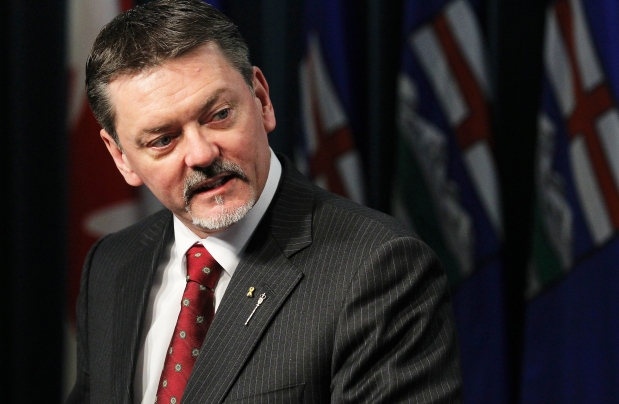EDMONTON – Alberta’s finance minister says there may be changes ahead for the province’s public pension plans.

By Friday, Finance Minister Doug Horner expects reports from the province’s public pension authorities suggesting what changes — if any — officials think should be considered to ensure the long-term sustainability of those retirement funds.
Horner asked for the reports after a meeting with pension authorities last July where he raised concerns about the long-term health of the pension plans. Those reports will start a public discussion about potential changes, he said.
“I don’t think, in my mind anyway, that there’s any question that we’ve got an issue that we’re going to have to work with them on,” Horner said, speaking last week to MLAs on the legislature’s Standing Committee on Resource Stewardship about his department’s proposed 2013-14 budget.
The review involves four public-sector pension plans in Alberta: the Local Authorities Pension Plan, the Public Service Pension Plan, the Management Employees Pension Plan and the Special Forces Pension Plan.
All are defined benefit plans, which means that members are entitled to a pre-determined monthly income upon retirement. Right now, Alberta Finance says about 230,000 Albertans contribute to those plans, while about 150,000 retirees and their beneficiaries are receiving benefits.
Collectively, the plans have an unfunded liability of $7.5 billion, which is the amount that future payments exceed the current value of the funds.
Under current legislation, the finance minister can impose changes on the Management Employees Pension Plan, but can only alter the other plans based on the recommendations of their boards.
The fact Horner is musing about potential changes has prompted many questions among plan members. Alberta Union of Provincial Employees’ executive secretary-treasurer Bill Dechant said he has heard concerns from members of all ages in recent months about surveys conducted by the pension authorities.
The union believes Alberta’s public sector plans can remain healthy with some minor tweaks. But the union wants workers to have a larger role in the governance of those pension authorities, Dechant said.
“If you really want to upset our membership, I’m understanding quickly that would be the way to go is touch their pension plan,” he said.
Horner said he will not ignore potential restructuring of public sector pensions because he worries the plans, left as-is, will leave taxpayers on the hook as the baby boom demographic becomes eligible for their benefits, and a smaller cohort of workers continues to pay into the plans.
But Horner said he understands why workers are concerned. “They do see this as something that was a commitment made to them at the time of employment. Hard to argue that,” he said.
As Finance minister, however, Horner said his job is to protect taxpayers too. He praised the pension boards for asking members some “courageous” questions. For example, could they consider raising the age for retirement benefits? Could they offer reduced benefits to someone taking early retirement?
Wildrose Finance critic Rob Anderson, MLA for Airdrie, said he is glad Horner is reviewing public-sector pensions. Anderson suggested it is time to switch all future employees to a defined contribution plan.
Under a defined contribution arrangement, employees receive retirement benefits according to a formula based on how much the worker and employer have paid into the plan over the years. Retirement earnings are estimated, but the precise benefits are not known until the worker retires.
Existing workers should hold onto the defined benefits promised to them, Anderson said, but the current system is too risky to maintain for future employees.
“The government would have to back the current pensioners until everyone is on a defined contribution plan and that’s going to be a 40-year transition. But if we don’t do it now, it’s going to get more and more expensive and more and more unsustainable,” Anderson said.
Horner will not rule out a rethink of the defined benefit plan. He cautioned, however, it is not necessarily a way to save money. “If you do something too rash, you may cost us a lot more,” he said.
Meryl Whittaker, president and CEO of the Local Authority Pension Plan, said that plan members are paying close attention to the review. Even prior to Horner’s request, LAPP, the seventh largest public pension plan in Canada, surveyed members in 2012 as part of an internal review into whether the 50-year-old plan was meeting their needs.
“We’re confident about the future of LAPP. We don’t consider that we’re in crisis,” Whittaker said. “Our contribution rates are getting higher and higher and have been over the past several years and that just can’t continue. That’s why we started looking at this issue more than a year ago.”
One of the messages LAPP will take to the minister is to consider each plan individually.
“We don’t believe there should be a cookie-cutter solution for all public-sector pension plans,” Whittaker said.


Comments